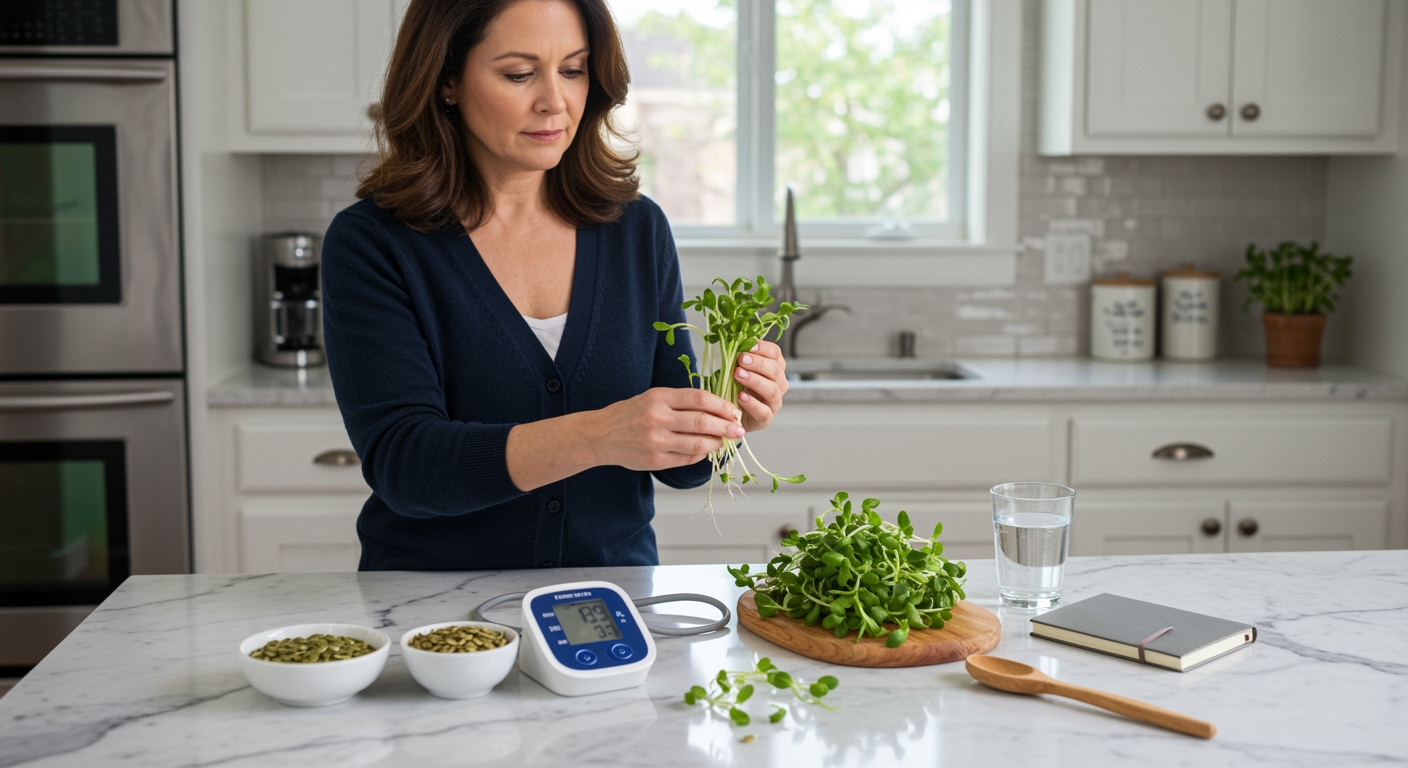✪ Key Takeaway: Pumpkin sprouts may lower blood pressure slightly, but they rarely cause dangerous hypotension in healthy people.
Introduction
Your friend just told you that pumpkin sprouts dropped her blood pressure dangerously low.
You might be wondering if these nutritious green shoots could push your already low blood pressure into dangerous territory.
Hi, I’m Abdur, your nutrition coach and today I’m going to explain whether pumpkin sprouts can worsen low blood pressure and what you need to know before adding them to your diet.
What Are Pumpkin Sprouts And How Do They Affect Blood Pressure?
Pumpkin sprouts are the young shoots that grow from pumpkin seeds when they germinate.
These tender green shoots contain concentrated amounts of potassium, magnesium, and other minerals that can influence your cardiovascular system.
Research shows that foods high in potassium can help relax blood vessels and reduce the pressure your heart needs to pump blood through your arteries.
When you eat pumpkin sprouts, the potassium works by balancing out sodium in your body and helping your kidneys remove excess fluid.
This process naturally leads to a mild reduction in blood pressure for most people.
However, the blood pressure lowering effect from pumpkin sprouts is typically gentle and gradual, not sudden or dramatic.
✪ Fact: One cup of pumpkin sprouts contains about 400mg of potassium, roughly 12% of your daily needs.
Can Pumpkin Sprouts Cause Dangerous Hypotension?
The short answer is that pumpkin sprouts alone are unlikely to cause dangerous hypotension in most people.
Hypotension occurs when your blood pressure drops below 90/60 mmHg, causing symptoms like dizziness, fainting, or fatigue.
For pumpkin sprouts to cause this level of blood pressure drop, you would need to consume massive quantities while having other risk factors present.
The potassium content in normal serving sizes of pumpkin sprouts is not high enough to create dangerous blood pressure swings in healthy individuals.
However, certain people may be more sensitive to the blood pressure effects of potassium-rich foods like pumpkin sprouts.
These include people already taking blood pressure medications, those with kidney problems, or individuals with naturally very low blood pressure.
✪ Pro Tip: Monitor your blood pressure for a few days after adding pumpkin sprouts to track any changes.
Who Should Be Cautious With Pumpkin Sprouts?
People taking blood pressure medications should exercise more caution when adding pumpkin sprouts to their diet.
ACE inhibitors, diuretics, and beta-blockers can amplify the blood pressure lowering effects of potassium-rich foods.
If you already have chronic hypotension with readings consistently below 90/60 mmHg, large amounts of pumpkin sprouts might worsen your symptoms.
People with kidney disease should also be careful because their kidneys may not process the extra potassium effectively.
Additionally, if you experience frequent dizzy spells or fainting episodes, adding potassium-rich foods like pumpkin sprouts might not be wise without medical supervision.
Pregnant women with gestational hypotension should also discuss pumpkin sprout consumption with their healthcare provider before making it a regular part of their diet.
✪ Note: Always consult your doctor before making significant dietary changes if you take blood pressure medications.
How Much Pumpkin Sprouts Is Safe For Low Blood Pressure?
For most people with low blood pressure, eating small amounts of pumpkin sprouts is generally safe.
Start with about 1/4 cup of fresh pumpkin sprouts per day and monitor how your body responds.
This amount provides beneficial nutrients without delivering enough potassium to cause significant blood pressure changes in most individuals.
If you notice increased dizziness, fatigue, or other hypotension symptoms after eating pumpkin sprouts, reduce the amount or stop eating them temporarily.
You can gradually increase the serving size to 1/2 cup per day if you experience no adverse effects after a week of smaller portions.
Remember that cooking methods can also influence how your body absorbs the potassium from pumpkin sprouts, with raw sprouts potentially having more immediate effects than cooked ones.
✪ Pro Tip: Keep a food and symptom diary to track how pumpkin sprouts affect your blood pressure and energy levels.
What Should You Do If You Experience Problems?
If you experience dizziness, lightheadedness, or fainting after eating pumpkin sprouts, stop consuming them immediately.
Sit down in a safe place and drink some water to help stabilize your blood pressure.
Contact your healthcare provider if symptoms persist or if you experience severe hypotension symptoms like confusion, rapid shallow breathing, or chest pain.
Your doctor may want to check your blood pressure readings and review any medications you are taking.
In the future, you might need to avoid pumpkin sprouts entirely or consume them only under medical supervision with regular blood pressure monitoring.
Keep in mind that individual responses to foods can vary greatly, and what affects one person may not affect another in the same way.
✪ Note: Emergency medical attention is needed if blood pressure drops below 70/40 mmHg or causes loss of consciousness.
The Bottom Line
Pumpkin sprouts can cause mild blood pressure reductions, but they rarely create dangerous hypotension in healthy people when consumed in normal amounts.
Smart nutrition means understanding your individual health status before making dietary changes.
I would love to hear about your experiences with pumpkin sprouts or any questions you might have about managing low blood pressure through diet, so please share your thoughts in the comments below.
References
At NutritionCrown, we use quality and credible sources to ensure our content is accurate and trustworthy. Below are the sources referenced in creating this article:
- WebMD: Health Benefits of Pumpkin Seeds
- University of Rochester Medical Center: Low Blood Pressure (Hypotension)
- Biomedical and Pharmacology Journal: The Effect of Pumpkin Seed Flour on Blood Pressure
- PMC: Nutritional and Health Benefits of Pumpkin





